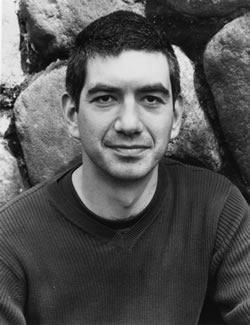|
I'm always on my students about their expository dialogue, like, "The killer is at the door, Jane! We've got five minutes to get out the back way!" This stuff goes against everything I teach. The character is reduced to the narrator's mouthpiece, language to the bare facts—however thrilling the plot, the words read with all the irony of an instruction manual. I want to tell my students that this kind of speech is a violation of dramatic art.
But I stop myself from saying that: Whenever a teacher of fiction mouths the word "violation," that teacher ought to know he's in trouble. There can be no rule against expository dialogue. After all, Shakespeare filled his characters' mouths with exposition, and there's little more beautiful than Othello's doubly expository speech describing the way he wooed Desdemona, when he tells the Venetians how he told her the story of his life:
And of the Cannibals that each other eat,
The Anthropophagi, and men whose heads
Do grow beneath their shoulders.
And the first chapter of Pride and Prejudice—when Mrs. Bennet tells her husband, "Have you heard that Netherfield Park is let at last?"—is almost entirely expository, and yet that dialogue is some of the wittiest and most stylish in English prose. So you cannot tell students that expository dialogue is verboten.
The question, as in so much writing, is not one of dos and don'ts, but of approaches to storytelling. Let's look at a detective novel, because there the demands for exposition are most stringent. At the opening of a traditional detective story, a client must come into the private dick's office and explain the fundamentals of the case. Then, at the close, the detective must make another expository speech, this time explaining all the motives and actions of the preceding pages. My favorite detective novel is The Maltese Falcon, and there the beautiful woman who enters Sam Spade's office says her name is Wonderly (it's actually O'Shaughnessy) and begins exposition in medias res: "I don't know where she met him. I mean I don't know where in New York. She's five years younger than I—only seventeen—and we didn't have the same friends. I don't suppose we've ever been as close as sisters should be."
Most students shoot for clarity in their expository dialogue, but one thing that makes this speech so excellent is its opacity—we're forced to scramble to understand her through Sam Spade's eyes. What's more, by the time Spade figures out what she's trying to say—"Miss Wonderly's sister ran away from New York with a fellow named Floyd Thursby"—it's beginning to come clear that she might not have a sister at all.
This shows off the true function of exposition—not to tell the reader what is really going on, but draw the reader into dramatic time, to bring them into the story's present moment. Exposition, I tell my students, can work just as well when it's a lie—in fact, it might even work better when it's a lie; drama need not stand on solid ground. Characters in fiction rarely tell the truth, stuck as they are in limited perspectives within unfolding events, and when they tell the truth, they tell it slant. That's why the opening of Pride and Prejudice works: "Oh! single, my dear, to be sure! A single man of large fortune; four or five thousand a year. What a fine thing for our girls!" Mrs. Bennet is so cravenly motivated that her attempts to state the facts read comic.
The final exposition in The Maltese Falcon is the most famous part of the book, and impossible to read in a voice other than Humphrey Bogart's: "When a man's partner is killed he's supposed to do something about it," it begins, and it ends, "Now on the other side we've got what? All we've got is the fact that maybe you love me and maybe I love you." There's little irony or dishonesty or emotion in Spade's approach—these are the facts, nothing could be clearer. The drama of the speech comes from the outrageous revelation of his character. His righteous inhumanity emerges, as though through Brigid O'Shaughnessy's eyes. He loves her, sure, but he will send her to prison, maybe to the gas chamber, for the murder of his partner, Miles Archer, a man he despised. He might as well be kicking her in the teeth.
Exposition, like so much else in fiction, works best when it's both felt and motivated. "This," says Othello, "is the only witchcraft that I have used." I can't teach my students to perform that sort of witchcraft, but at least I can ask them to marvel at its workings.
|


